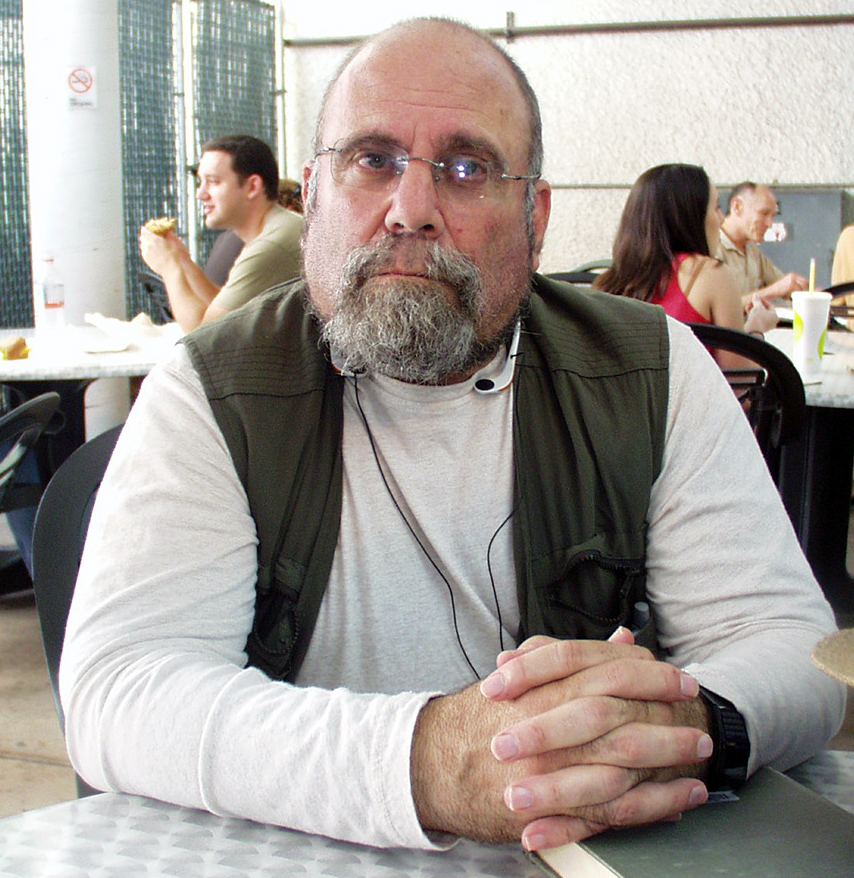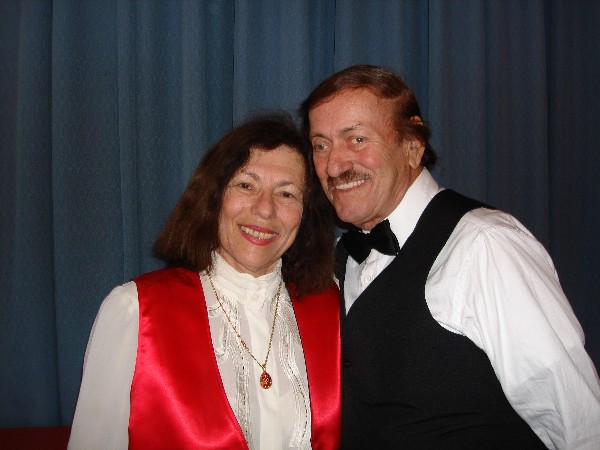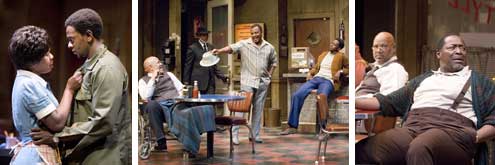|
Month of May to be Jewish-American
Heritage Month in the United States
Staff Report
WASHINGTON, D.C—President George W. Bush has proclaimed the month of May as
Jewish-American Heritage Month, the White House said.
A proclamation signed by the President today (Monday) called on all
Americans to schedule activities to celebrate the contributions of Jews
to the United States.
"Throughout our history,
Jewish Americans have contributed to the
strength of our country and the preservation of our values," Bush
said. "The talent and imagination of these citizens have helped our Nation
prosper, and their efforts continue to remind us of America's gift
of religious freedom and the blessings of God's steadfast love.
Jewish Americans have worked to promote civil rights and build
bridges ofmutual understanding among the world's religions. Their deep
commitment to faith and strong ties to family enrich our country and
set a positive example for others."
The President's proclamation added: "This month is also a time to
recognize the sacrifices of Jewish Americans who serve our Nation
in the Armed Forces. These brave men and women are dedicated to
freedom's cause, and all those who live in freedom live in their
debt.
"Jewish
American Heritage Month is an opportunity to honor the accomplishments of Jewish-American citizens and to remember that
our Nation is a melting pot of cultures. I join all Americans in
celebrating the rich Jewish heritage and the many ways they
contribute
to a bright future for our country.
Here is a link to the
full text of the proclamation.
________________________________________________________________
 The
Jewish
Citizen The
Jewish
Citizen
by Donald H. Harrison
__________________________________________________
An easy way to learn to speak Hebrew
You've always dreamed about that particular
house. Now it's on the market and you have enough money to afford it. What
do you do? Buy it! And that is the way the word for house in Hebrew,
bayit, is pronounced. Games that stimulate memory, known as
mnemonics, are part of the reason that
the Agency for Jewish Education-sponsored Hebrew courses are attracting and
retaining so many students, said Noah Hadas, the agency's director for adult
education.
 Developed by Dr. Zev bar-Lev, emeritus professor of linguistics at San Diego State
University, the Hebrew language program will be offered for
beginners this summer in separate Monday through Thursday morning classes and
evening classes, July 9-26. The $295 fee includes course materials. Developed by Dr. Zev bar-Lev, emeritus professor of linguistics at San Diego State
University, the Hebrew language program will be offered for
beginners this summer in separate Monday through Thursday morning classes and
evening classes, July 9-26. The $295 fee includes course materials.
"The methodology is a lot of fun, very verbal," said Hadas. "People enjoy
it." Unlike more traditional Hebrew
Linguistics Professor Zev bar-Lev
language classes, which may focus on
grammar, declensions, and other tenses, bar-Lev has sought to make the course
learner-friendly. Hadas commented: "Usually the retention rate
for other kinds of language classes is pretty poor. People don't realize
how hard they are until they get into them, and before you know it you
are down to
a few students. But with this methodology we have had much better than
anticipated retention."
Now in its second year, the course attracted two classes of 20 students
each in 2006, and six classes of the same size this year. The summer
school classes will be held from 9am to noon Monday through Thursday
at Congregation Beth Israel in La Jolla, and the evening classes will meet
from 6:30pm. to 9:30pm. also Monday through Thursdays.
Bar-Lev said mnemonics and other enjoyable learning strategies have
been combined into a technique with the acronym SILL—which stands
for "Sheltered Initiation of Language Learning." "I add a 'y' and call it the
'Silly' method," emphasizing that language learning should be fun,
bar-Lev said. What SILL means in non-academic English is that the
teacher "shelters the learner from an abundance of detail," bar-Lev explained.
"Most courses inundate people with too much detail."
So instead of trying to teach immediately the grammar for both genders in
Hebrew, bar-Lev and fellow linguist Alana Shuster
commence with the masculine gender and wait for
mastery before moving on to the feminine gender.
Bar-Lev, who has taught for 28 years at San Diego State in what is now
called the Linguistics & Asian and Middle Eastern Languages
Department, said he recently presented a paper to TESOL (Teaching
English to Speakers of Other Languages) in Seattle urging that the
methodology be adopted for English as well.
In fact, he said, although he speaks only four languages well and another
15 well enough to be a tourist in the country where it is spoken, bar-Lev
said he has been able to adapt his methodology to over 40 languages.
In Israel, the favored way to teach Hebrew to new immigrants is
immersion in an ulpan. Bar-Lev believes that for adults, his
system"
will make new language acquisition even easier.
____________________________________________________________________________
(paid advertisement)
Keruv (Hebrew:
To Bring Together}
Based at Tifereth
Israel Synagogue, we are a Jewish organization that reaches out and welcomes
intermarried couples. Please come and meet us when

|
Monsignor Dennis Mikulanis
Vicar for
Interreligious Affairs, Roman Catholic Diocese
discusses an issue of concern to both faiths
THE CATHOLIC CHURCH AND INTERMARRIAGE
Wednesday, 7 p.m.
Tifereth Israel Synagogue, 6660 Cowles Mountain Blvd.
For more information: Phil Snyder: (619) 475-7775
_________________________________________________________
The Jewish Grapevine

CYBER TREASURES —Hillel
Mazansky passes along for our enjoyment
two presentations on Israel that can be found on the
net: one a video on
YouTube; the other a musical
slide show, entitled "Israel Forever" featuring some fabulous scenic
photography.
PRAYER VIGIL—Rabbi Yeruchem Eilfort of Chabad of La
Costa shares with us the following: "It is a common practice in many
communities that when a member of the congregation is not well, the women of
the community gather to pray for that person's speedy recovery. Josie
Perez, the daughter of Elias and Rachel Perez, is in a coma and
needs our prayers! We will be holding a women's tehillim (prayer) group for
her recovery at the home of Rabbi and Rebetzin Eilfort on Tuesday, May
1st at 11:00am Directions may be obtained by calling Rebetzin Nechama at
(760)-612-9787. Please give charity in Josie's merit
even if you cannot attend the tehillim vigil. Thank you."
CAMPUS WHIRL—The Jewish Student Union at San Diego State University
was selected as theon-campus organization of the Year at the Aztec
Achievement Awards
______________
Filner backs plan to permit
undocumented
workers to pay fine and earn citizenship
SAN DIEGO (Publicity
Release)—Congressman Bob Filner announced
his support today (Monday) for H.R. 1645, the Security Through
Regularized Immigration and a Vibrant Economy (STRIVE) Act.
The bill, sponsored by Rep. Luis Gutierrez (D-Ill.) and Rep. Jeff
Flake
(R-Ariz) is the first comprehensive immigration legislation to come
before the 110th Congress.
"We do not need nor can we afford
to waste time with piecemeal legislation." Congressman Filner stated.
"We urgently need
comprehensive legislation that overhauls our broken immigration |
system and addresses the millions of undocumented immigrants living
and working in our society, all while keeping our nation safe and our
borders secure."
The STRIVE Act, which has bipartisan
support, and provides a
mechanism for undocumented immigrants to earn citizenship if they
agree to pay a fine, and submit to a background check. It also provides
increased resources for immigration enforcement and strengthens
security along the United States borders. The legislation is supported
by the National Council of La Raza and the American Immigration Lawyers
Association.
Here is a
link to the
text of the 697-page bill.
------------------------------------------------------------------------------------0
 Jews
in the News
------------------------------------------------------------- Jews
in the News
-------------------------------------------------------------
News spotters: Dan Brin in Los Angeles, Donald H.
Harrison in San Diego, and you;
if you spot a Jewish-interest story in your favorite publication, please
send us a link.
To see a
source story click on the link within the respective paragraph.
_______________________________________________________________________
*U.S. Sen. Barbara Boxer (D-Calif.),
siding with grocery workers
demand for more pay, said a comparison between present wage levels and
what her son Doug earned 21 years ago as a Lucky supermarket clerk
is, when adjusted for inflation, $4.86 per hour less today than it was
in 1986. Joe Matthews'
story on the grocery labor situation is in today's
Los Angeles Times.
*A crowd estimated
by the Los Angeles Times at 35,000 gathered in a
park in Encino to celebrate Israel Independence Day. Israel Consul
General Ehud Danoch was the featured speaker. Jia-Rui Chong wrote the
story.
*A political reform law jointly authored by Republican John McCain
and Democrat Russell Feingold, U.S. senators respectively from
Arizona and Wisconsin, is undergoing some serious scrutiny from the U.S.
Supreme Court—a development that is lauded as a victory for free speech
in
an editorial by the San Diego Union-Tribune.
*"Big Sunday" started as a Mitzvah Day for Temple Israel in
Hollywood, but it has spread across the city, and across religious lines, to
become a citywide day of doing good deeds. David Levinson is the
father of the
day which drew 50,000 participants yesterday. The
story by Susannah Rosenblatt and David Haldane is in today's Los
Angeles Times.
*Unlike former
Israel Prime Minister Golda Meir, who felt she had to
prove how tough she could be in a man's world, women on the world
political stage today are free to be more feminine. Jim Hoagland's
column
appears in today' San Diego Union-Tribune.
*Israel's Prime Minister Ehud Olmert and Defense Minister
Amir
Peretz were bracing for a report today by the commission charged with
looking into the conduct of the Second Lebanon War. The
story by
Amy Teibel of the Associated Press is in today's San Diego
Union-Tribune.
*Richard Perle and Paul Wolfowitz and other neo-cons
are described
by Republican U.S. Senator Chuck Hagel of Nebraska as peddling
nonsense about the alleged danger of terrorism from Iraq affecting
the
U.S. homeland. His comments are in a
column by Robert Novak in today's
San Diego Union-Tribune.
*The melt down of a section of freeway leading to the Oakland Bay
Bridge following the crash of a gasoline tanker will force San Francisco
Bay area commuters to find alternative routes to work for weeks if not
months, according to Jeff Weiss, a spokesman for the California
Department of Transportation. The Associated Press
story on the
spectacular mishap is in today's San Diego Union-Tribune.
__________________________________________________________
Our lives in
1st Person
Jewish community members
tell their stories in their own words
__________________________________________________________
We experience The Gift of the Magi
By
Joel A. Moskowitz M D
SAN DIEGO—When I was in grade school, I admired O. Henry's short story,
The Gift of the Magi. It was a story of love, sacrifice and devotion.
Little did I think then that I would be acting it out in my own life.
O Henry's theme is of two persons in love who at some significant
sacrifice give the other a gift. She sells her hair to buy a fob for his
gold watch. He sells his watch to buy a special comb for her glorious hair.
She no longer has the hair into which the comb might be set. He no longer
owned a gold watch toaffix to a fob. Yet they had a greater gift - love.
 This just past weekend of April 28 and 29, my loving wife and I
exchanged similar gifts. At Arlene's persuasion, I had allowed my name
to be entered in the selection for an Medical Master Teacher Award to This just past weekend of April 28 and 29, my loving wife and I
exchanged similar gifts. At Arlene's persuasion, I had allowed my name
to be entered in the selection for an Medical Master Teacher Award to
be presented on the occasion of this years Annual Alumni Celebration.
Photo: Courtesy Pacificaires
It had been 50 years since my graduation from State University College
of Medicine in New York City. It was with a mixture of pride andhumility that I learned that I had been chosen to receive the Richard
Day Master Teacher Award for Achievement in Pediatrics. The
ceremony was scheduled for April 28 in New York City.
For Arlene this same weekend was scheduled to be an experience for
which she had yearned since her youth. Although blessed with a
beautiful high soprano voice. her parents preferred she take piano
lessons instead. More recently Arlene, with my encouragement,
returned to singing. She sang in several Synagogue choral groups.
Knowledgeable music educators told her that her voice would be more
suitable for Italian opera. The opportunity to perform such a classical
piece in an illustrious venue as the Annual Balboa Park Festival in San
Diego eluded her.. until April 29.
Arlene's encouragement led to my having been designated as recipient
ofthe prestigious Master Teacher Award from my medical school. My
encouragement that she earnestly pursues her desire to sing resulted in
her singing an Italian Operatic piece "Nella Fantasia." Both Arlene's
performance and the Award Ceremony at which I was to receive
the Master Teacher Award were on the same weekend, 3000 miles apart. Arlene
didn't want me to miss this once-in-a-lifetime experience. I chose
to forgo the presentation ceremony for my award (April 28, New
York City) [My sister, Sheila, graciously agreed to accept it for me].
Rather, I would thrill to Arlene's long longed for chance to sing
operatically (April 29, San Diego).
The parallels to the theme of the Gift of the Magi, and our lives seem
poignant. O. Henry wrote, "But in a last word to the wise of these days
let it be said that of all who give gifts these two were the wisest. O all
who give and receive gifts, such as they are wisest. Everywhere they are
wisest. They are the magi."
Editor's Note: Mazal Tov to both of you. How sweet love can
be.
___________________

Arts
in Review
by
Carol Davis
___________________
August
Wilson re-creates
the 60s in
Old Globe's
Two Trains Running
SAN DIEGO—On April 23, news flashed on printing presses, on line and TV
announced that Turner County High School
(that’s in Georgia in case you missed it) will have its "first integrated
senior prom." Why is it still a segregated prom, you ask? “Because it’s
always been tradition to hold two different proms: One for Blacks and one
for Whites.” I don’t know if you’ve ever been locked out of a social,
political or economic situation or not, but tradition seems like a sorry
reason for continuing a policy that clearly smacks of discrimination.
I’m sure many of us Jew have felt
that pressure of denial and ignorance,
of discrimination and downright hate in the past as some still do in many
countries. But discrimination is discrimination whether it be against
Blacks, Jews or Gays. Whether or not you leave it in or take it out
of the history books, there are always oral historians like August Wilson
whose words will be remembered for generations. However, after the Civil
Rights Act, Blacks thought they had finally won their victory against
discrimination. They wanted what every other (White) citizen had; equal
rights, treatment and justice. It wasn’t always that easy as witnessed by
this latest news release in Georgia.
When Black Playwright August Wilson
wrote Two Trains Running in
1992, he had already penned Gem of the Ocean; Joe Turner’s Come
and Gone; Ma Rainey’s Black Bottom; The Piano Lesson; Seven Guitars;
and Fences. Yet to be written before his untimely death to cancer in
2005 were Jitney; King Hedley II; and Radio Golf. His gift to
us was to write
a decade by decade cycle of plays chronicling the Black experience in
20th century America. His history chronicle spanned the twentieth
century starting in 1900 with the slave trade in America to the next
generation.
Two Trains Running ,which
premiered in San Diego in 1990 at the
Old Globe, is back there once again in another multifaceted production
directed by The Globe’s associate artistic director Seret Scott. The
action takes place in the Hill District of Pittsburgh in Lees Cafe toward
the
end of the 60’s.The once booming neighborhood is almost deserted
and save for Memphis Lees’ eating establishment, which is on the auction
block, and a few other Black businesses, the area is slated for urban
renewal. The 60’s is already in the throes of civil strife and there’s
more to come.
Like so many other small neighborhood
businesses in this country,
there was always one store in particular, and probably one in every
ethnic group, where the locals hung out, shot the breeze, did some
dealings, made new contacts and without a doubt, knew everyone else’s
business whether they were regulars or not. Not much of what went
on in this diner contradicts this observation. Again, as in every ethnicity,
there is a rhythm to the conversation, a musical cadence, if you will.
Wilson’s characters in Trains are no different and it doesn’t take
long to follow the different tempo’s of each character. Some of the
language is politically incorrect in today’s politically correct
environment, but Wilson wrote as it was.
At the center of this drama, and a
large presence, both physically and emotionally is Memphis (Chuck Cooper).
His hue and cry is that he
wants fair market price for his property (not less than $25,000) and
he damn well better get it. He knows time is not on his side, but he will
hold out not matter what. If he has to go to City Hall every day, he will.
He was cheated out of some land years ago and it’s not going to happen
to him again.
His one and only Girl Friday is Risa
(Roslyn Ruff) who has major issues about her self esteem. In an act of
daring some time ago she disfigured
her legs leaving scars on them so as not to draw attention to her full
figure. She waits tables, makes the items on the daily menus and does
some shopping. She moves like someone in slow motion and is rather the
mystery woman in the group. Still, she has the unwanted attention of both
Wolf and Sterling.

|
Included in the regulars is Wolf (Montae
Russell), who runs the
numbers out of the diner and that becomes a bone of |
| (l-r)Roslyn Ruff as “Risa” and
Edi Gathegi as “Sterling”; (l-r) James Avery as “Holloway,” Al White
as “West,” Montae Russell as “Wolf” and Edi Gathegi as “Sterling”;
James Avery and Chuck Cooper as "Memphis." Photos by Craig Schwartz.
|
contention
between Memphis and himself even though Memphis bets a few here and
there. |
He’s what I would call "the
underworld figure." He knows where to purchase guns (carries one himself)
and makes sure everyone
knows about his conquests. Holloway (James Avery) is the store philosopher.
He is the voice of reason and experience. West (Al White)
is the community undertaker and the wealthiest of the group because
“everyone dies sometimes.” West is dressed like a dandy in black
from head to toe including black leather gloves. And while he shows up now
and then, he carries a large presence. He would like to buy
Memphis’ property, but won’t offer him fair market price. Another little
song and dance.
There is a character named Hambone
(Willy C. Carpenter) who is a bit
off his rocker always in a fit because he once painted the fence of the
local butcher (white) and the butcher promised him a ham if he did a good
job, but instead gave him a chicken. It’s a recurring visit he makes, and no
one seems to take notice of him, but no one can completely ignore him;
somewhat like the issue of segregation. All are pretty much ‘old school’,
follow-the-rules-and-you-will-be- rewarded types. Rounding out the
group is Sterling (Edi Gathegi) the new kid on the block. He just got out
of jail and is fightn’ ready to join Malcolm X in his quest for ‘Black
Power’. He sees Martin Luther King as passé. He has eyes for Risa, but so
far, she ignores him.
I would be remiss if I failed to
mention the one inanimate character,
the jukebox which garners more attention while it’s broken than when it
finally works in the last scene of the second act. There is also an
offstage, 350-year-old woman, Aunt Esther, whose name is used in reverence
as
their spiritual guide. Another wealthy local whose body is on display
in the funeral parlor for all to pay their respects is also a common topic
of conversation. All three become the center of some conversation at
one time or another.
In what amounts to a little close to
three hours, we are leisurely drawn
into Wilson’s slice of life drama not so much by what happens, because there
is very little action going on, by what’s being said. This is a community of
friends, shooting the breeze, worrying about property, money, politics and
the future. They dance a dance that can only look
like it’s been rehearsed because they have been around the floor before
and with the same people. With the exception of Sterling, who manages
to snag just what he wants, his future and their past are on a collision
course.
With a talented cast that has a clear
understanding of where they fit in
this picture drama, Cooper’s Memphis holds his own while retelling a
sorrowful tale of anguish when his property was stolen from him years
ago. In such situations as Memphis ordering Ruff’s Risa around in a
fatherly-like scolding way to White’s West continual low balling Memphis
for the sale of his property, all the characters fit like a completed
puzzle. Montae Russell’s Wolf is a powerhouse of anxious energy and drive
while James Avery’s Holloway’s confident and soothing manner lends
an absolute credibility to his philosophical teachings.
Roslyn Ruff’s Risa is a bit more
difficult to figure out. Shy at the outset,
one almost has to wonder what this character is about. Willie Carpenter’s
Hambone is one character you will not forget. His portrayal of the
troubled man is right on target and if you have ever been downtown
and seen some of the street people you will understand. Finally, Edi
Gathegi’s Sterling is another storehouse of energy just waiting to blossom
to be, what? That is the unanswered question.
Karen Perry’s costumes are right on
target 60’s. With Chris Rynne’s
lighting and Tony Fanning’s picture perfect 60’s set. all is reminiscent of
many local diners of the past having everything in it needed to be
serviceable including that jukebox. In the background are two larger than
life portraits of Martin Luther King, Jr. and Malcolm X hanging over the
set as a reminder of a future still unsettled. Across the street from the
diner are a series of business signs in black and white of establishments
out of business; another gauge of the signs of the times. It’s a
worthwhile production and a chance for one more look at a struggle,
from other eyes, in another era, that has yet to be resolved.
Two Trains Running will
continue through May 27th. Globe Box Office can be reached by calling:
619-23GLOBE or on line at:
www.TheOldGlobe.org.
See you at the theatre.
|



